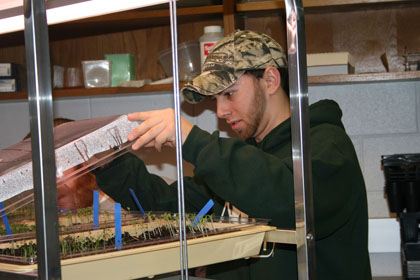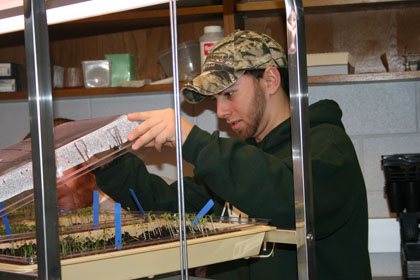First-year agricultural education teachers are earning an annual salary of $45,000. So why is there a shortage of these teachers around the state?
That’s the dilemma facing leaders in ag education, like Jason Peake, associate professor, and Diana King, assistant professor, at the University of Georgia College of Agricultural and Environment Sciences on the Tifton campus.
A 30-year trend
“The last research we conducted shows Georgia still has a shortage of agriculture teachers, and that trend has continued for the past 30 years,” Peake said.
Many factors contribute to the deficit, Peake said. Employees are not staying in the same position for 30 years anymore. Peake estimates 50 percent of Georgia’s agriculture teachers either move or leave the profession within the first five years. Other factors include geographical limitations. Many graduates, who are trained as agriculture teachers, aren’t able to relocate.
“Take April Richards,” Peake said. “Relocation would be difficult for her. April is married with a family, and they have a family farm, so she became a science teacher in Tift County. It’s not exact job placement, but it’s close to her field. It is still education … it’s still teaching … her students benefit from her ability to connect science with real world agriculture and increase ag-literacy.”
No summers off
Those in agricultural education are also quick to discover their positions aren’t like other teaching jobs. Ag teachers have a 12-month contract. They consult with students in their school’s agricultural programs throughout the summer.
It’s not uncommon for some teachers to have between 120 and 180 students in their program, and they work extended days — meaning an additional hour of work each day after school. They serve as advisors for their local FFA chapters, attending livestock shows and conventions and spending many weekends on the road.
However, Peake points out that if agriculture and children are your passions, this is the profession for you.
“Teaching agriculture is a way of life, not just a job,” Peake said. “It’s been a good way of life for me and many of my students. If you love it, it’s the best job you can ever have.”
It is also one of the best paying jobs a new college graduate will find. Starting salaries for first-year ag teachers, with a bachelor’s degree and a teaching certificate, are about $45,000 in Georgia.
“That is good money for a 22-year-old starting their career,” Peake said.
Ag ed program in Tifton growing
While agriculture education programs lack teachers, Peake has seen a steady increase in students in the agricultural program at the UGA Tifton campus. Nine years ago, five students were enrolled in Tifton. Last year, there were 15 graduates. Fourteen more will graduate this May.
“We have had approximately 75 students come through the program in the past nine years and only two that have not completed,” Peake said. “We’re looking at a 97 percent completion rate, which is great. Once they graduate, our job placement rate is above 95 percent. That is a big deal.”
Peake would like to see the numbers increase in years to come. He’d like to grow the program to produce 20 new ag education graduates each spring.
“The state of Georgia demands high-quality teachers,” Peake said. “We’re producing a good, quality product. But I would like to see some competition for the positions that exist. When your job placement is that high, it’s great; you feel good about it. The other side of that coin is, should there be some competition for those jobs? I would like to see Georgia have a few extra agriculture teachers each year instead of scrambling to fill positions.”
For more information on the ag-teaching program, visit www.caes.uga.edu/campus/tifton.





